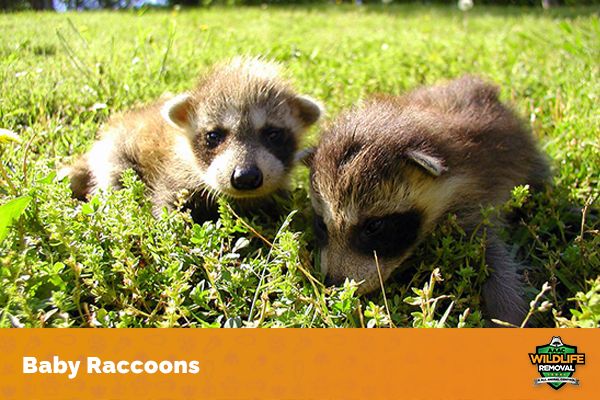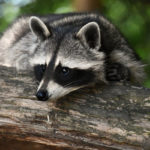Did you know that raccoons mate between late winter and early spring? Suppose you live in an area with these adorable masked bandits. In that case, you might wonder what exactly goes on during the raccoon mating season.
Without further ado, here are facts about the raccoon mating season you need to know!

Raccoon Mating Season Is Between January And June
Raccoon mating season generally occurs between January and June. However, in some areas, it can start as early as the first weeks of December and last until July, late spring.
Late winter to early spring becomes the perfect season because it gives the female enough time to store fat. This will support her during pregnancy and wean her young raccoons.
Other mammals, like skunks and foxes, have an overlapping breeding season with raccoons. Skunks have theirs from January to Mid-March and foxes from late December to the end of March.
Raccoons Are Solitary Animals But Come Together To Mate
Raccoons are generally solitary animals, similar to tigers, polar bears, and pandas. They sleep, eat, and hunt alone- preferring to live without companions.
However, during mating season, they will come together to mate. Male raccoons will endlessly search for a mate during this time and will mate with as many females as possible. Once they find a female, they follow her around until she is ready to mate.
After mating, the male and female raccoons will go their separate ways, and the female will then raise the offspring on her own.

Male Raccoons Are More Likely To Fight In Mating Season
No wonder male raccoons are more likely to fight during the mating season- they’re trying to impress the ladies! Wrestling to show off their strength.
When two male raccoons meet, they usually try to intimidate each other by making loud noises and showing their teeth. If that doesn’t work, they will start fighting. The fights can sometimes get pretty violent, with the two raccoons biting and clawing at each other, which can even result in death.

Raccoon Mating Call Sounds Like The Whistling of a Screech Owl
During the breeding season, you might hear a strange whistling sound at night. This is the raccoon’s mating call, and it sounds like an owl screeching. The male will use this call to try to attract a mate.
The female will usually answer with a loud “honk.” Once they find each other, the male will follow the female around and make a screeching sound until she signals that she is ready to mate.
Remember that it’s not just raccoons during these seasons, so expect to hear other screams, hisses, and whimpers from skunks and foxes.
Male Raccoons Mate With Multiple Females
Interestingly, male raccoons are polygamous. They will mate not just with one but with multiple females. This is because the female raccoon is only fertile for a few days, and the male wants to ensure that he can impregnate them.
During the female’s fertile period, the two will mate multiple times over several days. The male will move on to another female when she is no longer productive.
Raccoons Can Be Quite Loud When Mating
If you live in an area with raccoons, you might want to prepare for some noise. They’re not just loud when they call for their mate, but they can also be quite noisy during the actual mating process, especially for the males.

Mother Raccoons Give Birth To Litters Of 3-5 Young
The baby raccoons are called “kits,” born blind and deaf. After a gestation period of about 63 days, the mother raccoon will give birth to a litter of 3-5 young but can reach up to seven kits in some cases. The mother will take care of them until they are old enough to fend for themselves, usually around 4-5 months.
Baby Raccoons Are Born Blind and Deaf
As mentioned, these adorable little creatures are born blind and deaf. When they first open their eyes, they are usually blue but will eventually turn brown. This usually lasts for about two-three weeks.
Their fur is also different from that of adults. The kits will have a soft and fluffy coat that is grayish in color. As they grow older, their fur will start to change into the typical raccoon’s color, a mix of black, brown, and gray.

There Is No Better Place For Raccoon Mothers Than Your Own Attic
Ever wondered why raccoon mothers prefer your attic? That’s because it provides the perfect environment to give birth to and raise their kits. It is warm, safe, and quiet- everything a mother raccoon needs to take care of her babies.
If you find a raccoon in your attic, chances are she has given birth and is just trying to provide warmth for her young. The best thing you can do is to leave her be and wait for the babies to grow up and go on their own. You don’t want to handle dead babies and fight off raccoon mothers if you force them out.
There are also cases where mothers leave their newborn raccoons. The raccoon babies are considered orphans if they are not seen after a day or two. If they still don’t go away after child-bearing and maturity, it’s time to call for a professional.
Call our AAAC Wildlife Removal team if such problems occur. These raccoon kits require extreme care and gentle handling. We are professionals in this field. We’ll humanely remove the raccoon babies and ensure no other wildlife can nest in your home.
Mother Raccoons Are Very Protective Of Their Young
Like how mothers love their babies, raccoons are also very protective of their young. It is their instinct behavior to defend the young under fear and threat. If she feels like her babies are in danger, she will do everything she can to protect them. This includes fighting off other animals, predators, and even humans.
This is one of the few reasons they prefer your house’s attics. They think it’s the safest site away from predatory species like bobcats, coyotes, and wolves. They’ll be far more likely to die or be swept away by the harsh weather when they’re outside.
As with other wild animals, these critters could carry the rabies virus and other diseases. So if you come across this wildlife, it is best to leave them alone. Unless, of course, you want to get into a fight with a wild animal.

Raccoon Families Will Stay Together For About A Year
A raccoon family usually stays together for about a year. The young will remain with their mother to learn how to fend for themselves and survive in the wild. It’s estimated that at eight weeks, the young raccoons can already leave the nest and eat solid food.
Once they no longer need parenting and are old enough to survive, they will leave their mother and move on. They’ll usually settle into urban environments, forests, or new territories where they can scavenge for food. Then, they find their own mate and raise their family (if female). And the cycle starts all over again.
Male Raccoons Do Not Involve Themselves In The Rearing Of Young
Unlike the females, male raccoons do not involve themselves in the rearing of the young. In fact, they will usually leave the female and her kits once they are done mating.
You will only see a male raccoon with a female and her litter when he tries to mate with her again. Other than that, they will go their separate ways.
Most Of The Time… Their Den Is Temporary, But They’ll Eventually Settle Somewhere Safest
Did you know that their homes are just temporary? Yes, you heard us right! When the female raccoons are finally about to breed and give birth, that’s the only time they establish their own permanent spaces.
They love places with little to zero disturbance. These can be your attic, your chimney, the hollows of your ornamental trees, or rock crevices around your property.
They may look for other entry points in your house. It may be under your porches, sheds, and decks.
Final Word
So there you have it- If you live in an area where these furry critters are prevalent, it is best to be aware of their mating season. This way, you can avoid any potential confrontations or problems. If they’re causing issues, call our pros at AAAC Wildlife Removal, and we’ll be happy to help you get rid of the raccoons on your property!
Originally published at AAAC Wildlife Removal: https://aaacwildliferemoval.com/blog/raccoons/facts-about-raccoon-mating-season-you-need-to-know













